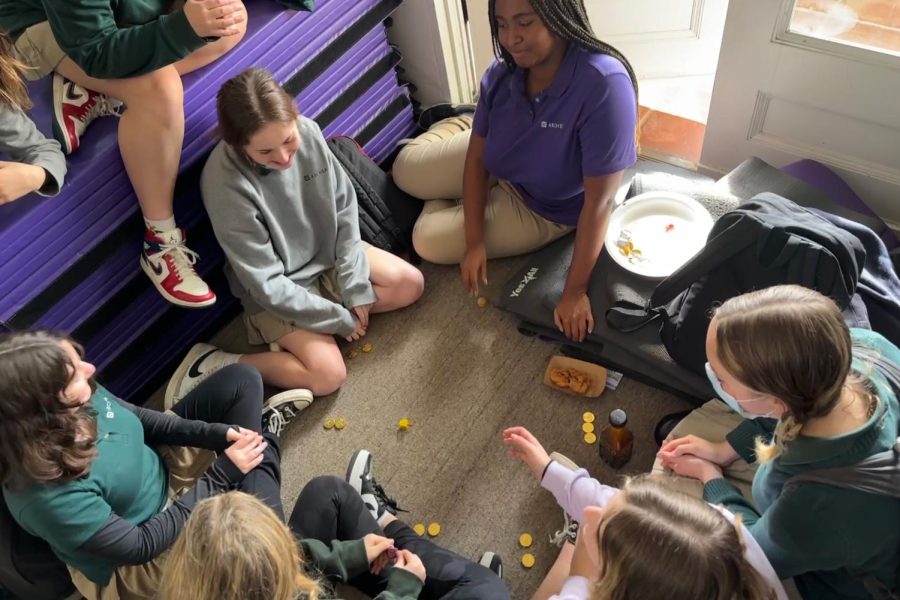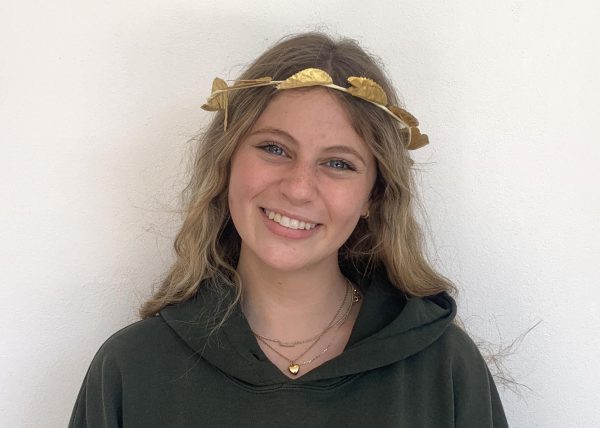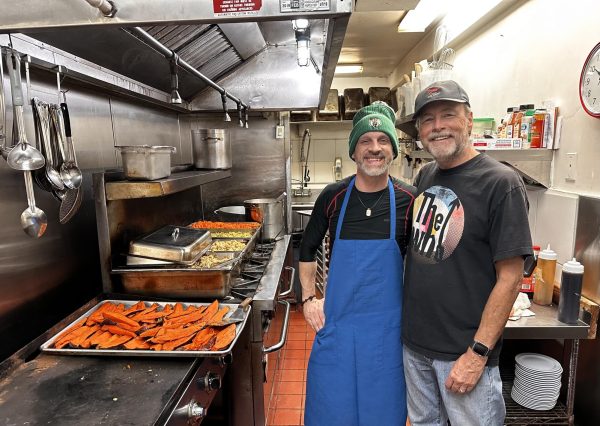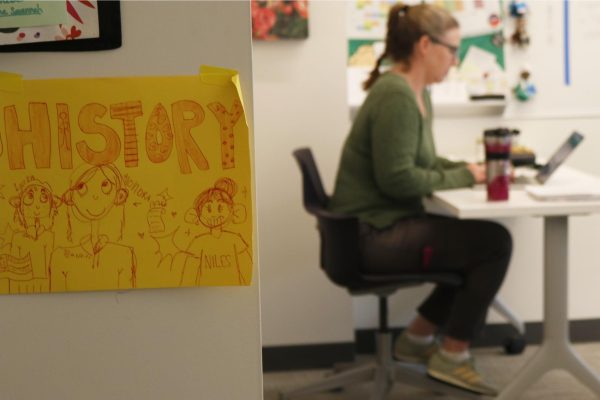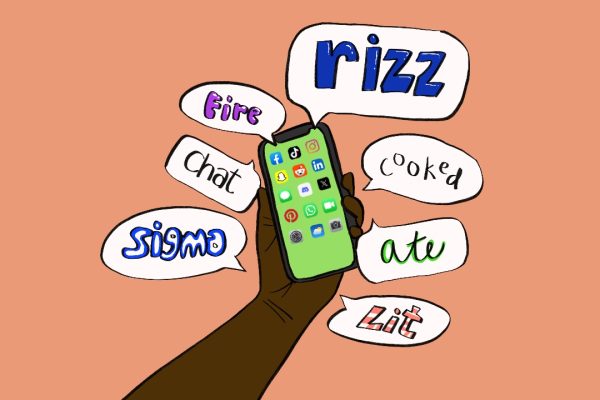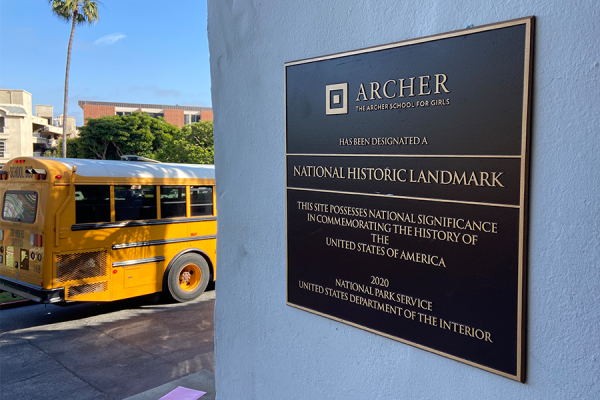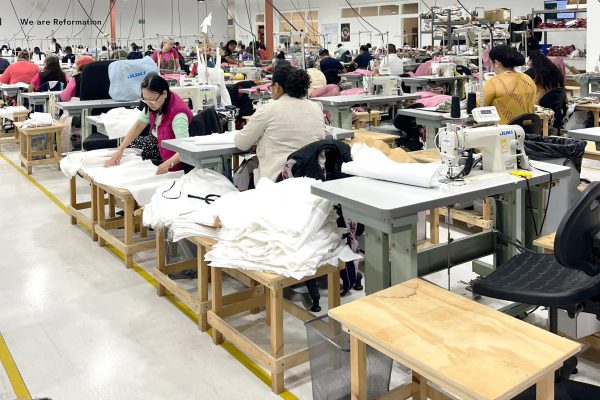As antisemitism rises across country, education combats hate
Photo credit: Archer Communications
Middle and upper school students spin dreidels, eat Latkes and win gelt. Archer’s Jewish Student Union gathered Dec. 11 to celebrate Hanukkah. This is one of the many affinity spaces at Archer where students can join together and connect with peers who share the same identity as one another.
April 27, 2023
In October, Beverly Hills and Century City residents found antisemitic flyers on their driveways stating the Jewish community started COVID-19. In January, an armed gunman shot two Jewish men walking to Shabbat services in West Los Angeles. Both of these hate crimes were fueled by antisemitism.
Los Angeles has experienced an uptick in antisemitism in 2022 and 2023. As defined by Merriam Webster, antisemitism is “hostility toward or discrimination against Jews as a religious, ethnic, or racial group.” According to the Anti-Defamation Leagues‘ annual audit, there was a 29% increase in antisemitism from 2020-2021. There were 182 antisemitic incidents in 2021, which is a 217% increase across five years in comparison to 84 incidents in 2017.
The Importance of Education
Executive Director of the Lee Liberman Foundation and outgoing chair of USC Shoah Foundation’s Next Generation Council Lisa Hofheimer said the most effective way of combating antisemitism is through education and conversation. Hofheimer said hearing survivors of the Holocaust speak and being able to educate oneself through their testimony is a powerful tool.
“This is a perfect time to introduce the antisemitism curriculum into Archer if they haven’t already,” Hofheimer said. “The whole notion of being able to watch something and then discuss it with your peers and be able to say, ‘How did that make you feel?’ is powerful.”
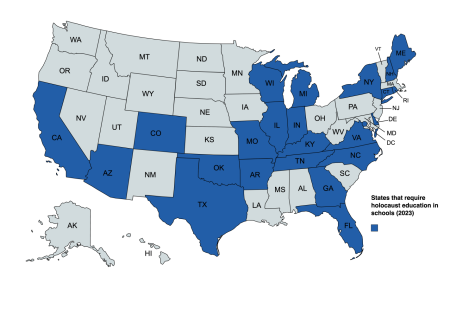
According to Hofheimer, it is easier to teach antisemitism to students than to adults. A study completed by Princeton University supports Hofheimer’s statement, finding “Childhood may be evolution’s way of performing simulated annealing.” Hofheimer said she believes students have a greater ability to change their beliefs based on what they are taught in school.
“The adolescent brain has much more plasticity and has much more ability to change,” Hofheimer said. “You aren’t entrenched in your ideas you’re learning all of these things, and you’re changing your opinions all the time.”
Hofheimer said she worries not enough schools are taking the correct steps when it comes to education about antisemitism and the Holocaust. She said students of all races, ethnicities and religions need to have open and supportive conversations about their identities. Hofheimer argued that with antisemitism and hate crimes on the rise, it is important for schools to create spaces for vulnerable conversations to occur.
“It starts with telling stories and giving people a story where they can see themselves in the story,” Hofheimer said. “It’s not going to be useful for you to hear about a 90-year-old man who might have been in his 40s during the Holocaust. It’s going to be much more relevant for someone, like you, to see someone talking about when they were 15 or 16 years old. Feeling the injustice and unfairness of the story is what fosters empathy.”
To learn more about why Hofheimer believes why it is important to learn about antisemitism in school listen to the audio clip below.
Co-leader of Archer’s Jewish Student Union Sophie Wallack (‘23) said she applauds Archer’s efforts in fighting antisemitism. For International Holocaust Remembrance Day, Holocaust survivor Trudie Strobel spoke to the student body about her life since she discusses before during, and after World War II as a Jewish person. Strobel was born in what was formerly the Soviet Union in 1938.
“I think that was a super impactful experience because many students were able to watch,” Wallack said. “The most important way to combat antisemitism is to hear directly from Holocaust survivors or from people who’ve directly faced antisemitism. It’s one thing to send an email to talk about problems in our community, but that’s not going to do anything to face or help combat community-wide issues.”
The Importance of Discussion and Reflection
Samantha Hazell-O’Brien, dean of student life, equity and inclusion, took a class at UCLA titled Equity-Centered Leadership Seminar, taught by Dr. Tonikiaa Orange, as part of UCLA’s Educational Doctoral program. She said she took this class to make sure what she is discussing with students is not unintentionally causing harm. While studying antisemitism and the historical past of tropes associated with the Jewish community, Hazell-O’Brien learned Judaism is a culture and antisemitism directly attacks culture — not just religion.
“I find in studying antisemitism with students that people truly just think it’s happening at institutions of religion,” Hazell-O’Brien said. “To better understand Judaism you have to know it is religion and culture. It’s not just an attack at a synagogue.”
Hazell-O’Brien said it’s important to make sure that when antisemitism is relevant to a topic in class, it must be brought up. She said focusing on making sure that battling antisemitism is taught during assemblies and through guest speakers is integral to her job.
“I find in studying antisemitism with students that people truly just think it’s happening at institutions of religion,” Hazell-O’Brien said. “To better understand Judaism you have to know it is religion and culture. It’s not just an attack at a synagogue.”
— Samantha Hazell-O'Brien, Dean of Student Life, Equity and Inclusion
“You should be learning about antisemitism in context,” Hazell-O’Brien said. “For example, financial literacy — making sure that you’re not leaning into a trope, specifically saying things like banks or banking institutions are connected to Jewish people. I think if we can contextually understand antisemitism and then socially interact with the culture in a positive way — it helps illuminate for students, the multi-facets of our culture, and also the very still real-life tropes and phrases that are trying to cut down on people.”
Archer hosts spaces where students can talk about their Jewish identity and gain support from the community. Wallack said she finds it important to host infinity spaces like this because of the rise in antisemitism throughout California. JSU, and other clubs, often host these spaces in times of need, such as affinity spaces to talk about the rise of antisemitism in Los Angeles.
“We have a lot of club meetings and affinity spaces where it’s an open conversation,” Wallack said. “People can just talk about whatever they want pertaining to antisemitism and their identity, it’s a great time for a space like this.”
Two years ago, there was antisemitic and racist hate speech written in one of the campus restrooms, prompting Hazell-O’Brien to call for a mandatory all-school zoom meeting Jan. 4, 2021.
“During the beginning times, we were still relying on community members to say, ‘What did you see?’ Behind the scenes, I’m interviewing and meeting with any student who recalled anything related to the n-word slur or seen anything related to Jewish people written on the sticky notes,” Hazell-O’Brien said. “We did an assembly where I broke down what is restorative accountability, step by step. You see, you have a school that’s trying to respond and get facts by interviewing students, while also trying to bring everyone together and teach them to say, ‘This is inappropriate.’ The framework for that is restorative accountability.”
According to the Office of Justice Programs, restorative accountability is the “focus on repair of harm to the victim.” Hazell-O’Brien said Archer’s main goal when taking initiative to combat antisemitism in society is creating a safe space for Jewish students affected by hate while simultaneously educating students who are not Jewish.
“We must honor the group of people who are most directly impacted,” Hazell-O’Brien said. “We must understand that others’ stories are important, but right now it’s not the focus. We must open up a space and make sure the students that are impacted are able to see their friends coming to this meeting and understand that these teachers, these friends – they support me.”
Hazell-O’Brien and Hofheimer both stress the importance of Holocaust and antisemitism education. Hofheimer said without education, propaganda will turn into laws and make itself present in government. She argued that as antisemitism is on the rise in the United States, it is important to take action immediately.
“It starts with propaganda being written about people, which is the use of tropes. Then it turns into policy and laws,” Hofheimer said. “The reason why people need to speak up is because we don’t want policies and laws implemented in a place like the United States, and we worry about democracy in general here right now.”




